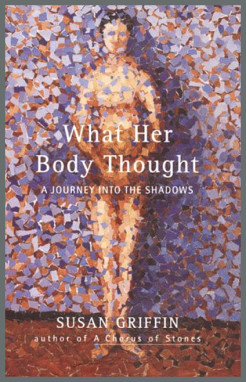WRESTLING WITH THE ANGEL
OF DEMOCRACY
On Being an American Citizen
Susan Griffin’s Wrestling with The Angel of Democracy: On Being an American Citizen (Trumpeter), continues what she began in A Chorus of Stones (a New York Times “Notable Book”) as the third volume of what she calls a social autobiography, and seems especially relevant as Americans face a presidential election that has the potential to turn our country toward true environmental stewardship, diplomacy untainted by war, and a fairer and more consistent form of democracy. In Wrestling with the Angel of Democracy, Griffin examines her life in the context of larger histories and the way these histories emerge in one’s life, and explores the role democracy in America has shaped both her life and her consciousness. As the book progresses, she becomes an active participant in the processes she describes, voicing dilemmas that concern all Americans, with the intent to shape history and democracy herself.
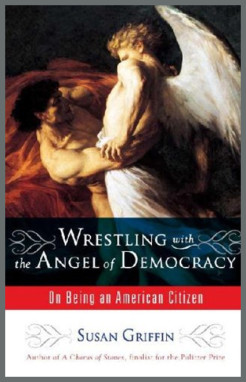
The BOOK Of THE COURTESANS
A Catalogue of Their Virtues
The tradition began in ancient Greece, in a time when sexuality and spirituality were not divided and where many courtesans were also priestesses of Aphrodite. From this time until the first decades of the 20th century, courtesans were kept by wealthy and powerful men, including kings and emperors, princes, aristocrats, entrepreneurs, statesmen, artists and writers. Often born to poverty, these women rose to unimaginable heights, gaining great personal wealth and fame. Unlike most upper class women, courtesans were allowed to mingle freely with men, attend salons, frequent cafes and artist’s studios, speak openly about forbidden subjects and hence were privy to an education rare for their gender. Many became accomplished as poets, novelists, philosophers, wits, painters. Yet, as The Book of the Courtesans reveals, being a courtesan was an achievement in its own right. read more
The Book of the Courtesans:
Provocative and compelling, rescues from near some of history’s most outrageous and audacious women.”—Alice Walker
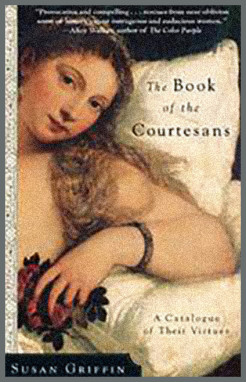
TRANSFORMING TERRORISM
Remembering the Soul of the World
Edited by Karin Lofthus Carrington and Susan Griffin www.transformingterror.com
This inspired collection offers a new paradigm for moving the world beyond violence as the first, and often only, response to violence. Through essays and poetry, prayers and mediations, Transforming Terror powerfully demonstrates that terrorist violence—defined here as any attack on unarmed civilians—can never be stopped by a return to the thinking that created it. A diverse array of contributors—writers, healers, spiritual and political leaders, scientists, and activists, including Desmond Tutu, Huston Smith, Riane Eisler, Daniel Ellsberg, Amos Oz, Fatema Mernissi, Fritjov Capra, George Lakoff, Mahmoud Darwish, Terry Tempest Williams, and Jack Kornfield—considers how we might transform the conditions that produce terrorist acts and bring true healing to the victims of these acts. Broadly encompassing both the Islamic and Western worlds, the book explores the nature of consciousness and offers a blueprint for change that makes peace possible. From unforgettable firsthand accounts of terrorism, the book draws us into awareness of our ecological and economic interdependence, the need for connectedness, and the innate human capacity for compassion.
Visit the Transforming Terror website
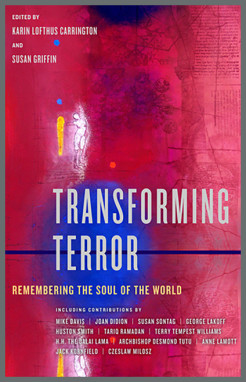
A CHORUS OF STONES
A Chorus of Stones offers a radical revisioning of the nature of war and gender, through an illuminating interplay between between private suffering and public tragedy. The book sets the story of the invention, development, manufacture and use of the first atomic bombs against the background of struggles played out in the private lives of major figures in history and ordinary citizens. Griffin shows how, for instance, formative moments in the childhood of Henirich Himmler’s, the head of the SS,who supervised the production of V2 rockets by concentration camp prisoners, or conflicts in the marriage of Paul Tibbitts, the pilot who dropped the atomic bomb over Hiroshima, reveal the critical underside of war, the system of denial, secrecy and repression that fuels both public and private life. From the understanding that the usual separation between these two worlds is a habit of the Western mind (one that shapes conventional notions of history and history itself), she moves the domestic or “feminine” world to center stage, lending it thus a heretofore unrecognized significance in the unfolding of public events. A Chorus of Stones is a Pulitzer Prize Finalist.
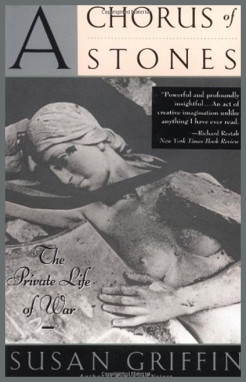
THE EROS OF EVERY DAY LIFE
In The Eros of Everyday Life, Susan Griffin once again takes readers on a startling journey, showing the profound connections between religion and philosophy, science and nature, Western thought and the role of women, and the supremacy of abstract thought over the forces of life. Featuring the brilliant original title essay that is nothing less than an intellectual and emotional exploration of the nature of Western society itself, as well as Susan Griffin’s best previously published essays of the past decade, The Eros of Everyday Life combines the beautiful lyricism and sensibility of a poet with the intellectual rigor of one of the finest and most original minds writing today.
Nobody writes more lyrically about ecology or more wisely about gender than Susan Griffin. And nobody knows better how the two must be seen as one. This nourishing book is an example of her work at its best.”—Theodore Roszak, author of The Memoirs of Elizabeth Frankenstein
Griffin’s essays yearn in a wonderful direction.”— Hungry Mind Review
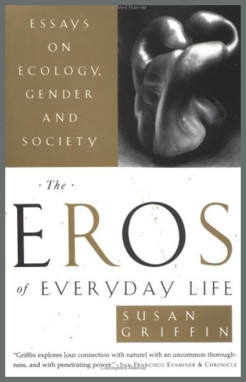
WOMAN AND NATURE
In Woman and Nature, Susan Griffin reveals the connection between feminism and ecology. Among the first to explore this subject, she probes the patterns of thought and behavior that have led to the destruction of nature, the oppression of women and the diminishment of both in the Western imagination. She elucidates the association of women with matter in European culture in the work of seminal thinkers from Plato to Freud, and shows how this prejudicial assumption is an influence on and a consequence of religious ideas, the development of science and reductive views of the material world. The book includes references to diverse events, the witch burnings, 19th century attempts to control female sexuality, strip mining, clear cutting and secretary pools, employed both as realistic examples but also as symbols of a culture that divides spirit from matter, emotion from intellect, nature from consciousness, while inventing ideas of masculinity and femininity that embody these divisions. Now considered a classic of both environmental and feminist literature, the book is at once lyrical, playful and unsparing in its critical perceptions. read more
Woman and Nature:
…perhaps the most extraordinary nonfiction book to have emerged from the matrix of female consciousness.”—Adrienne Rich
Click here to read Jeanine Canty’s interview with Susan Griffin, who discusses her book, Women and Nature, and today’s discriminatory climate. (September 1, 2015)
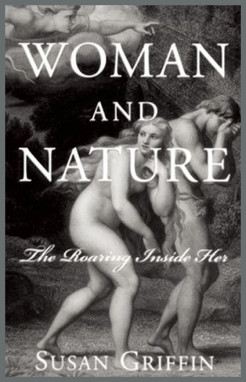
WHAT HER BODY THOUGHT
For three years, philosopher and feminist theorist Susan Griffin was afflicted with Chronic Fatigue Immune Dysfunction Syndrome (CFIDS). Hobbled by constant pain, weakness, insomnia, and diminished thinking, she was forced to rely upon friends just to get through each day. In this book, similar in spirit to her earlier A Chorus of Stones, Griffin examines both the experiences of her own body and the body politic. Using the story of Marie Duplessis, a nineteenth-century courtesan who died of tuberculosis at the age of 23, the author is able to explore the links between illness, poverty, sin, isolation, and shame. read more
The life of the body is at the heart of my story,” writes Griffin. Through a series of poems, she alludes to the different moods, mysteries, and manifestations of the flesh. She processes the various film portraits of Duplessis — popularized as Camille — and finds in them an inkling of her feelings of shame at inching so near to poverty while suffering the effects of a compromised immune system. In the country of illness, she also encounters memories of childhood abandonment and squares off with apprehensions about her own death. What Her Body Thought presents a compelling account of the interplay between illness, story, meaning, and the soul.—Frederic and Mary Ann Brassat
